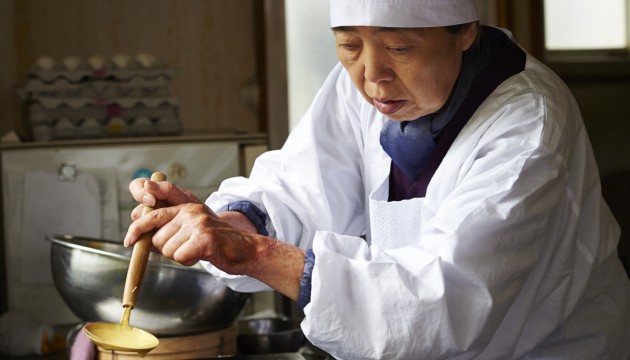Les Délices de Tokyo, presented at the last Cannes Film Festival in the Un Certain Regard category, is the new film by Naomi Kawase, director of Still The Water, which was also presented at Cannes last year. Adaptation of the book An, a novel written by Durian Sukegawa, the film echoes an unlikely encounter between a strange and marginalized old woman, past master in the making of dorayakis, and an abandoned man and plagued by doubts, also seller of these delicacies.
Characters at the center of the film

The Delights of Tokyo is a subtle and exciting work very representative of the usual Japanese cinema: a quality aesthetic, a worked script, interesting characters, and metaphors galore. A feature film with impeccable technique, distilling a pleasant image texture, carried by a slow and appreciable pace and sharing a warm atmosphere around very human, realistic characters, easy to identify.
Truly well staged, Kawase's feature film highlights an important series of notions, exciting unifying themes on the meaning of life, the course of existence, on the relationship between individuals, minorities, generations.The director confronts her viewer with the twists and turns of the story via her main characters, and especially Tokue, an endearing, funny and reasoned old woman, a kind of Yoda of the manufacture of dorayakis, both humble and full of wisdom, and having a lot to teach anyone who will listen. The whole film is based on the relationship she will have with Sentaro, manager and cook of a small dorayokis shop. He is a former prison inmate in his forties well packed and struck by the melancholy of not having been able to become a bartender, as he wished. But from this loneliness, he will draw an encounter, which could change his life.

The Delights of Tokyo: A Generational Film
Kawase highlights the relationship between generations. Three generations are on screen, interacting, and learning from each other. This representation of time that passes through this generational crossing exposes the intellectual, psychological and character evolution of an existence. The high school girls are full of vitality, carefree, are noisy, talkative, endearing while the fiftieth anniversary is sad, in full ideological questioning, in full personal and philosophical doubt, he no longer has the joy of living and seeks meaning in his existence. Then comes the last generation, or rather the first, that of the elders, the one supposed to have lost the taste for existence faced with a difficult and tortured end of life.
Yet Tokue is a subtle blend of the contradiction resulting from the comparison of the other two generations : a character saddened to grow old, to feel life slipping through his fingers, but also carefree, breathing a newfound vitality. Tokue has been able to overcome old age, to free herself from regrets, resentments, incessant fears to focus on activities she cherishes: dorayaki cooking. Tokue's character is a spiritual guide, a true anchor, a life lesson. He finally comes to see that rests on his frail and yet so powerful shoulders, the maintenance of the passage of knowledge, the learning of an art of cooking, the knowledge of the vagaries of life, the wisdom incarnate, a voice to listen to for all the misguided specters of existence such as the character of Sentaro. The latter will be inspired by her, learn from her, get closer to people, to nature which also has a prominent place in the feature film.
Les Délices de Tokyo seeks to reconcile the viewer with nature, the human being and his own mistakes.
With Les Délices de Tokyo, Kawase wants to teach his viewer, overwhelmed by constraints, to enter into communion with his neighbor and his environment. For her, it is important to remain attached to certain saving personal precepts not to be abandoned. Les Délices de Tokyo seeks to reconcile the viewer with nature, the human being and his own mistakes, his tortured past, to accept his regrets, it is an ode to tolerance, a condemnation of rejection, of the marginalization of individuals victims of an old error of judgment, in this case still current in the film because of ignorance and prejudices inked in popular belief, the pathology of which Tokue is a victim is the proof, the resentment of a beautiful waste, perhaps even the allegory of a second world war that ended in the absolute carnage of the atomic bomb. The Delights of Tokyo prefers memory, forces memory, not to omit the negative aspects of our previous history without remaining stuck in this infamy and continuing to move forward. Tokue utters a touching and meaningful sentence that says you can miss out on success but never miss existence.
Les Délices de Tokyo is therefore a great success, a touching film about relationships, the passing of time and the human condition.
The trailer:





































